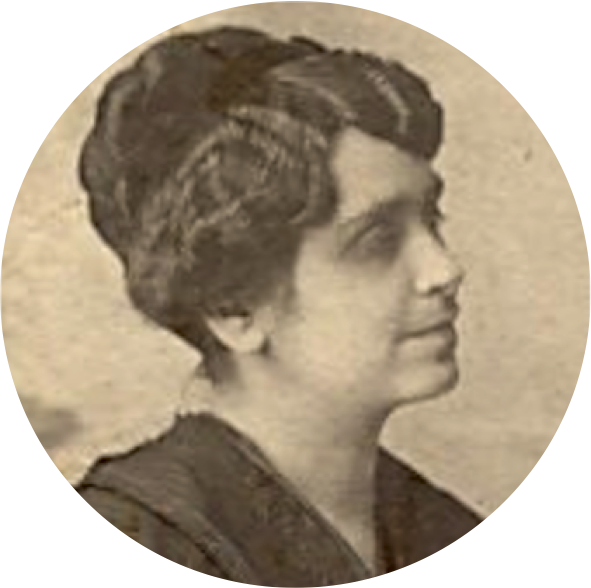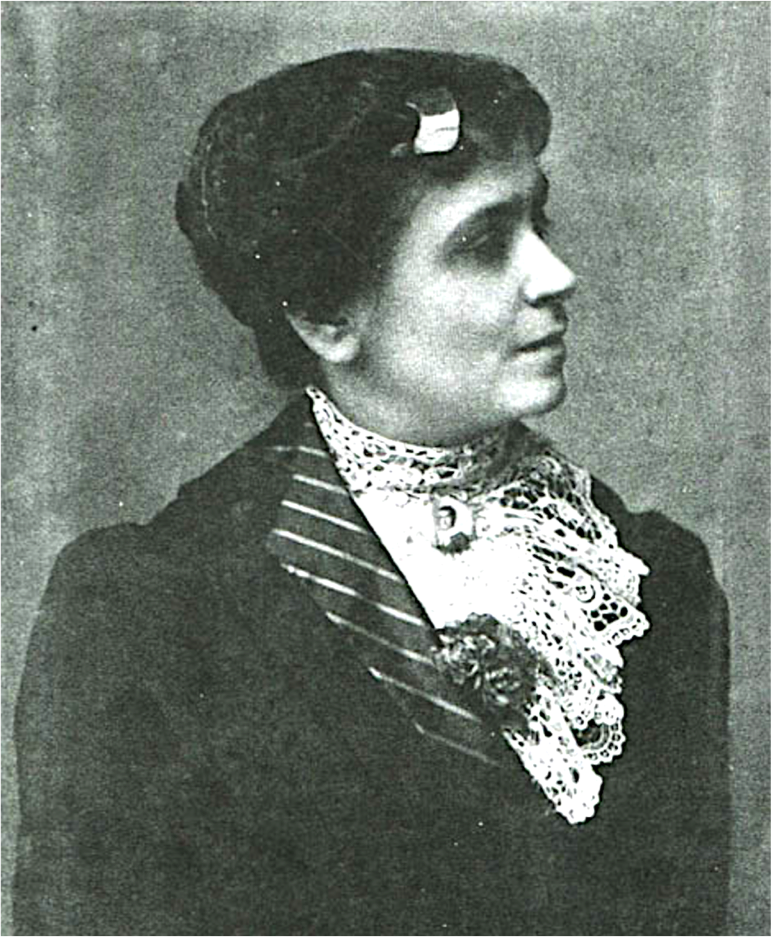

Maria Carolina Frederico Crispin, best known as Maria Veleda - a pseudonym certainly inspired by the Germanic priestess Veleda, famed by her unsubmission to the Roman Empire and immortalized by Chateaubriand in the epic Les Martyres -, was born on the 26th of February of 1871, in Faro.
A much-admired figure of the first Portuguese feminist generation, she directed a major part of her efforts towards the socially disadvantaged, specifically by fighting for the rights of the female factory workers, as did Angelina Vidal.
As with Vidal and other intellectual women of the time, Veleda experienced a turbulent youth, as she was forced to begin to work from an early age, following the death of her father, in order to help support her family. In this sense, she chose to give lessons, in which she injected a quite modern and uncommon, at the time, teaching methodology. As a primary school teacher, she taught in her birthplace, Faro, but also in Serpa (a city located in the Alentejo province), until she decided to move to Lisbon, in 1905.
Prior to her arrival in Portugal´s capital, she had already begun to write, initially for the magazine A Tradição (The Tradition) – whose directors allegedly were a decisive influence on her progressive thinking – and, later, by publishing a collection of short stories for children, in 1904. Throughout her career, she would also write the novella A Casa Assombrada (The Haunted House) and collaborate with several periodic publications, having even directed some of these.
After having faced, during her first months in Lisbon, a new period of serious financial difficulties, Veleda would eventually stabilize her situation when she was invited to teach at the Afonso Costa School Center, where she became acquainted with prestigious figures of the republican movement, hence beginning to politicize herself. Shortly afterwards, she would be attending and speaking in rallies and republican sessions – almost always exclusively surrounded by men -, thus helping to boost and energize a movement that was rapidly preparing itself to overthrow the monarchic regime and seize power. Veleda herself would later compile many of these conferences at which she spoke in the book A Conquista (The Conquest), published in 1909.
Simultaneously, she also consolidated her progressive views towards the adverse condition of women, having been responsible for the launching of the Portuguese Group of Feminist Studies – in operation between 1907 and 1908 -, whose purpose was to disseminate the feminist ideal and foment the education of Portuguese women, alongside Ana de Castro Osório, Adelaide Cabete and Carolina Beatriz Ângelo. In 1908, she became one of the founding members of the Republican League of Portuguese Women (RLPW), of which she would eventually assume the position of President of the Board. In 1909, teaming with the RLPW, she played a decisive role in the creation of the Maternal Work, an institution focused on gathering and educating children roaming and begging through the streets of Lisbon. After the 5th of October Revolution – which marked the implantation of the Republic - Veleda would even represent this organization at the 17th International Congress on Free-Thinking.
Following the dissolution of the RLPW - mostly due to disagreements she had with Ana de Castro Osório in what concerned the issue of women´s suffrage - Veleda kept defending the cause of the Maternal Work, while concomitantly working at the recently-founded Central Infant Tutoring Center of Lisbon.

Maria Veleda in 1912.
In 1915, she founded the Female Association of Democratic Propaganda, whose ideology rested on her conviction that women should not exclude themselves from politics, but rather be united against inequality, reaction and militarism, constantly guided by compulsory free-thinking.
In 1925, she published the aforementioned novella Casa Assombrada, giving rise to a close bonding with the mystical, esoteric and spiritualist universe, a journey in which she was joined by her writer friend Maria O´ Neill. In parallel, disenchanted with the chaotic and violent course that the republican regime – which she had helped to raise – had taken at the beginning of the 1920s, she abandoned all political activities in 1921. Maria Veleda died on the 8th of April of 1955.
On the 5th of October of 2009, the CTT (Postal Services of Portugal) issued a collection of stamps intended to pay tribute to a group of “women whose actions and testimonies transformed them into figures indelibly associated with the history of the Republic”. Such collection, aptly titled Women of the Republic, “evokes activists of female rights from the early days of the Republic”, and in it one can find Maria Veleda, along with Ana de Castro Osório, Carolina Michaëlis de Vasconcelos, Angelina Vidal, Adelaide Cabete, Carolina Beatriz Ângelo, Virgínia Quaresma and Emília de Sousa Costa.
Maria Carolina Frederico Crispin, nome de baptismo de Maria Veleda – pseudónimo seguramente inspirado na sacerdotisa germânica Veleda, insubmissa ao Império Romano e imortalizada por Chateaubriand na obra Les Martyres -, nasceu a 26 de Fevereiro de 1871, em Faro.
Figura de relevo da primeira geração feminista portuguesa, direccionou grande parte dos seus esforços activistas para os mais socialmente desfavorecidos, designadamente lutando pelos direitos das proletárias, conforme fez Angelina Vidal.
Igualmente à semelhança de Vidal e de outras mulheres intelectuais da época, viveu uma juventude conturbada, sendo obrigada a começar a trabalhar cedo, no seguimento da morte do seu pai, para providenciar o sustento familiar. Nesse sentido, optou por dar aulas, às quais injectava uma metodologia de ensino bastante moderna e incomum para a época. Enquanto professora de ensino primário, leccionou na sua cidade-berço, Faro, mas também em Bucelas, Odivelas de Ferreira do Alentejo e Serpa, até se decidir pela migração para Lisboa, em 1905.
Ainda antes, já havia começado a escrever, primeiramente para a revista A Tradição, editada em Serpa – cujos directores terão influído decisivamente no seu pensamento progressista – e, mais tarde, ao publicar uma colecção de contos infantis, em 1904, igualmente em Serpa. Ao longo da sua carreira, haveria ainda de escrever a novela A Casa Assombrada, para além de colaborar com várias publicações periódicas, entre as quais o Diário Ilustrado, Ave Azul, Nova Aurora, República, Sociedade Futura, O Independente, Almanaque das Senhoras, A Mulher e a Criança, A Madrugada, O Século e a Pátria, tendo inclusivamente dirigido algumas destas.
Após ter experienciado, aquando da sua chegada a Lisboa, novo período de graves dificuldades económicas, Veleda acabaria por estabilizar a sua situação ao ser convidada para leccionar no Centro Escolar Afonso Costa, onde veio a travar conhecimento com figuras ilustres do movimento republicano, assim começando a politizar-se. Pouco tempo depois, passaria a frequentar e a discursar em variados comícios e sessões republicanas – quase sempre rodeada exclusivamente de homens -, ajudando a conferir dinamismo e entusiasmo a um movimento que se preparava, a passos largos, para derrubar a Monarquia e assumir o poder. De resto, muitas destas conferências em que interveio directamente haveriam por ser compiladas, por sua própria iniciativa, na obra A Conquista, publicada em 1909.
Concomitantemente, consolidou também a sua visão progressista relativamente à condição adversa da mulher, tendo estado na génese do Grupo Português de Estudos Feministas, activo entre 1907 e 1908, cujo propósito era o de propagar o ideal feminista e conduzir um trabalho de instrução das mulheres portuguesas. Desta organização, para além de Maria Veleda, faziam parte Ana de Castro Osório, Adelaide Cabete e Carolina Beatriz Ângelo. Em 1908, tornou-se uma das sócias fundadoras da Liga Republicana das Mulheres Portuguesas (LRMP), onde seria secretária, tesoureira e presidente da Direcção. Em 1909, em parceria com a LRMP, foi decisiva na criação da instituição Obra Maternal, vocacionada para a recolha e instrução de crianças abandonadas e pedintes, que pelas ruas de Lisboa deambulavam. Após a revolução de 5 de Outubro, Veleda viria inclusivamente a representar esta organização no XVII Congresso Internacional do Livre-Pensamento.
No seguimento da dissolução da LRMP, em grande parte devido a divergências que manteve com Ana de Castro Osório e que se prendiam com a questão do sufrágio feminino, Veleda continuou a defender a causa da Obra Maternal, ao mesmo tempo que trabalhou na recém-criada Tutoria Central da Infância de Lisboa. Em 1915, fundou a Associação Feminina de Propaganda Democrática, cuja ideologia assentava, uma vez mais, na sua convicção de que as mulheres não se deveriam excluir da política, mas sim unir-se para combater a desigualdade, a reacção e o militarismo, norteadas pelo necessário livre-pensamento.
Em 1925, publicou a supracitada novela Casa Assombrada e deu início a uma forte aproximação ao universo místico, esotérico e espiritualista, a que se juntou a sua amiga escritora Maria O´ Neill. Com efeito, no mesmo ano, ambas se associaram à organização do I Congresso Espírita Português. Veleda foi também responsável pela criação da Federação Espírita Portuguesa e das revistas A Asa, O Futuro e A Vanguarda Espírita. Paralelamente, desencantada com o rumo caótico e violento que o regime republicano - que havia ajudado a erguer - tomou a partir da década de 20, abandonou a actividade política em 1921.
Maria Veleda morreu a 8 de Abril de 1955.
A 5 de Outubro de 2009 os CTT fizeram uma emissão filatélica com o objectivo de homenagear um grupo de “mulheres cuja acção e testemunho as tornaram figuras indelevelmente associadas à história da República”. Esta coleção, denominada Mulheres da República, “evoca activistas dos direitos femininos dos primeiros tempos da República”, e dela faz parte Maria Veleda, juntamente com Ana de Castro Osório, Maria Veleda, Adelaide Cabete, Angelina Vidal, Carolina Beatriz Angelo e Carolina Michaëlis de Vasconcelos, Virgínia Quaresma e Emília de Sousa Costa.
Pelo Edital de 19 de Junho de 1976 foi dado o seu nome a uma rua da Urbanização Quinta dos Condes de Carnide.
References:
- CASTRO, Zília, ESTEVES, João (dir.), Dicionário no Feminino (séculos XIX-XX), Lisboa, Livros Horizonte, 2005.
- SAMARA, Maria Alice, Operárias e Burguesas: As Mulheres no Tempo da República, A Esfera dos Livros, Lisboa, 2007.
- Toponímia de Lisboa, Rua Maria Veleda.